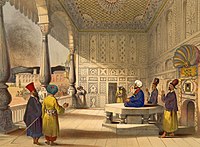
Back Fazal Haq Chaliqyar German Φαζάλ Χακ Χαλικυάρ Greek فضل حق خالقیار Persian ファズルリハク・ハレキヤル Japanese فضل حق خالقيار Pashto/Pushto Халекьяр, Фазль-уль-Хак Russian Фазл Ҳақ Холиқёр Tajik Фазль-уль-Хак Халекьяр Ukrainian
This article needs additional citations for verification. (June 2008) |
Fazal Haq Khaliqyar | |
|---|---|
| Chairman of the Council of Ministers | |
| In office 8 May 1990 – 15 April 1992 | |
| President | Mohammad Najibullah |
| Preceded by | Sultan Ali Keshtmand |
| Succeeded by | Abdul Sabur Farid Kuhestani as Prime Minister of Afghanistan |
| Personal details | |
| Born | 1934 Herat, Kingdom of Afghanistan |
| Died | 16 July 2004 (age 69–70) Amsterdam, Netherlands |
| Political party | Independent |
| History of Afghanistan |
|---|
 The palace of the emir in 1839 |
| Timeline |
Fazal Haq Khaliqyar (1934 – 16 July 2004) was an Afghan politician who served as the Chairman of the Council of Ministers of Afghanistan from May 1990 to April 1992.[1]
He performed duties as deputy Minister of Finance during Mohammad Daud Khan's rule. He was appointed as Council of Ministers chairman during the period of President Mohammad Najibullah government.[1] For the first time since 1978, a free parliamentary debate was held in order to select the Council of Ministers chairman. On May 21, 1990, Khaliqyar, who was non-party figure, was selected to this position. He replaced PDPA hard-liner Keshtmand. However, Khaliqyar's cabinet kept PDPA stalwarts in all the key security posts.
By the end of May 1990, A loya jirga was convened in Kabul, which ratified constitutional amendments providing for multiple political parties, ending the PDPA's and the National Front's monopoly over executive power. On December 11, 1990, President Najibullah inaugurated a National Commission for Clearing Mines and Unexploded Ordnance from the Lands of the Republic of Afghanistan under the chairmanship of Khaliqyar.
A Moscow-brokered plan called for Najibullah to step aside in favour of Khaliqyar, who would serve as a transitional administrative leader until a new government could be elected. In October, Mujaddidi praised Khaliqyar's government and said that he would consult his more radical colleagues on sharing power with him in a transitional government.
Later he backed off from this pledge due to pressure from hard-liners. The Mujaheddin said his association with Najibullah made him unacceptable for any compromise. His government ended with the fall of Najibullah in April 1992, led by the transition of power towards the Mujaheddin. On July 16, 2004, Khaliqyar died in Netherlands at the age of 70.
- ^ a b Elizabeth Sleeman, Taylor & Francis Group and Europa (2003). The International Who's Who 2004. Psychology Press. ISBN 9781857432176. Retrieved 2009-03-23.